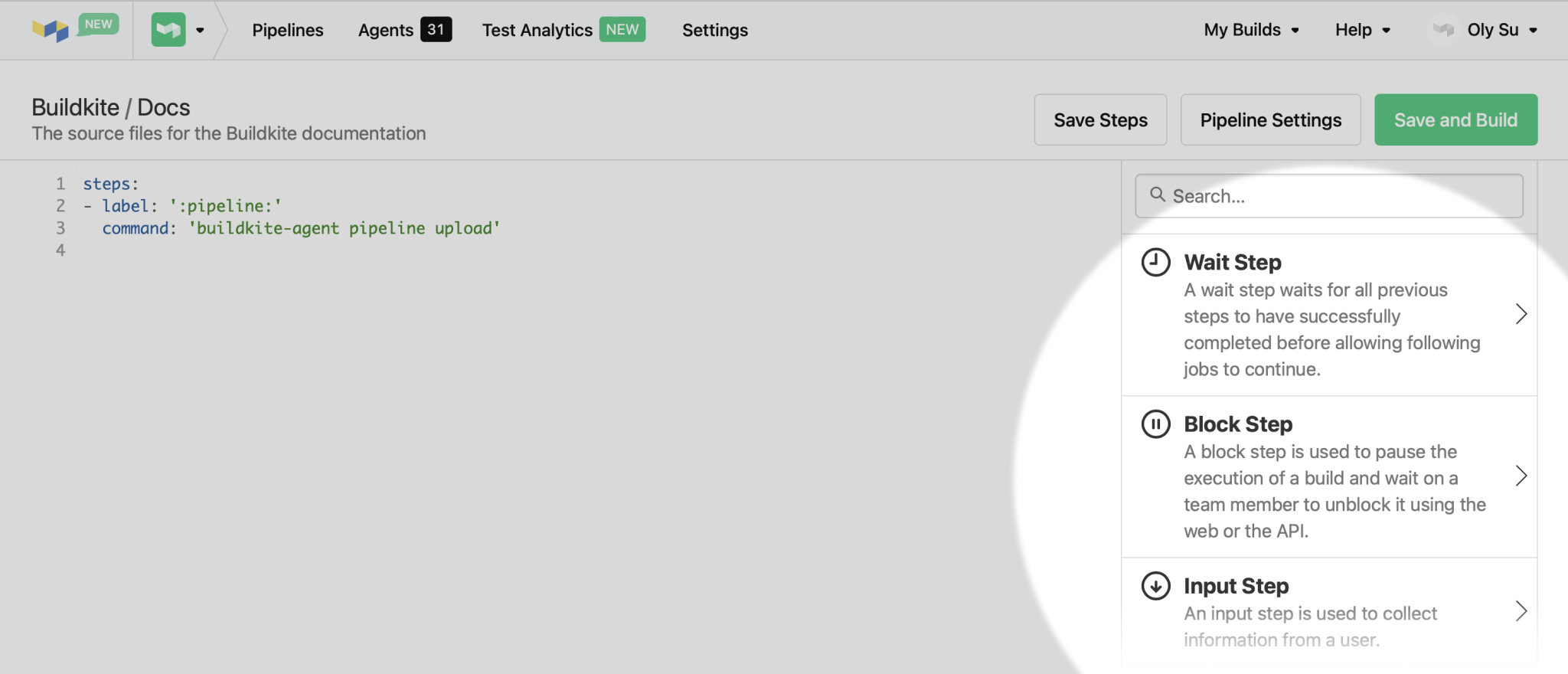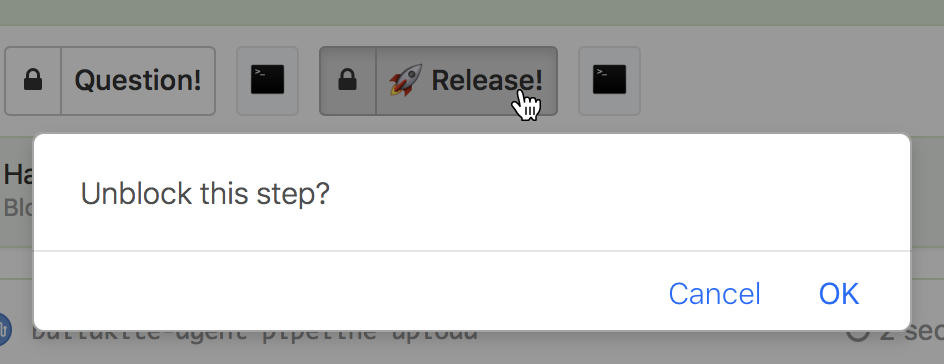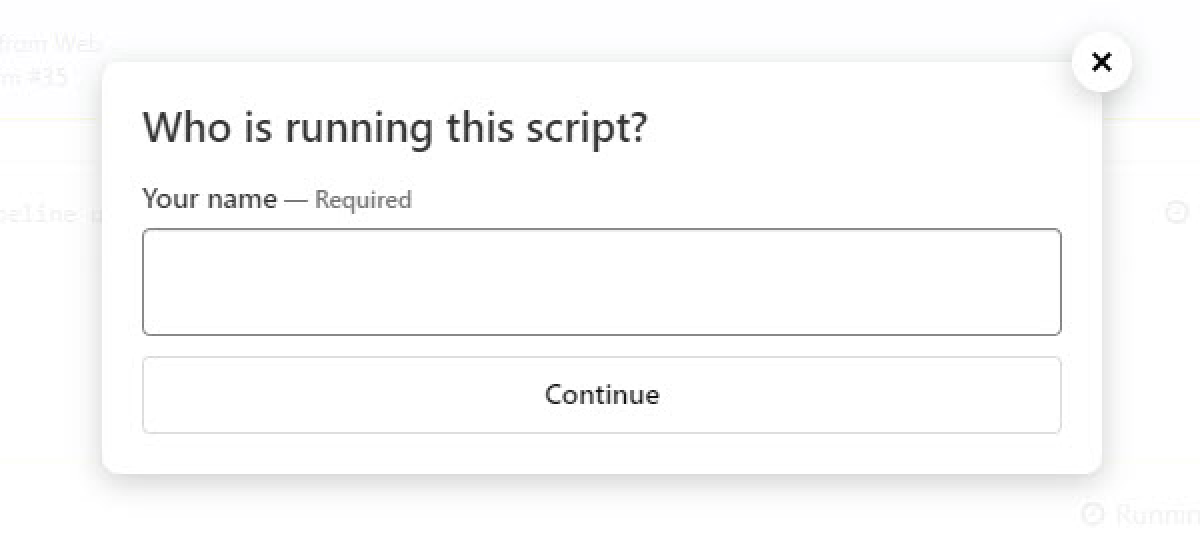Managing step dependencies
All steps in pipelines have implicit dependencies, often managed with wait and block steps. To manually change the dependency structure of your steps, you can define explicit dependencies with the depends_on attribute.
Implicit dependencies with wait and block
Wait and block steps provide an implicit dependency structure to your pipeline.
By adding these steps to your pipeline, the Buildkite scheduler will automatically know which steps need to be run in serial and which can be run in parallel.

A wait step, as in the example below, is dependent on all previous steps completing successfully; it won't proceed until all steps before it have passed. All steps following the wait step are dependent on the wait step; none of them will run until the wait step is satisfied.
steps:
- command: "one.sh"
- command: "two.sh"
- wait
- command: "three.sh"
- command: "four.sh"
Block steps perform the same function, but also require unblocking either manually or using an API call before the rest of the steps can be run.

If you are collecting information with your block steps using the prompt or fields attributes but don't want it to implicitly depend on the steps around it, you can use an input step.
steps:
- input: "Who is running this script?"
fields:
- text: "Your name"
key: "name"

Defining explicit dependencies
The depends_on attribute can be added to all step types.
To add a dependency on another step, add the depends_on attribute with the key of the step you're depending on:
steps:
- command: "tests.sh"
key: "tests"
- command: "build.sh"
key: "build"
depends_on: "tests"
In the above example, the second command step (build) will not run until the first command step (tests) has completed. Without the depends_on attribute, and given enough agents, these steps would run in parallel.
Note that a step with an explicit dependency specified with the depends_on attribute will run immediately after the dependency step has completed, without waiting for block or wait steps unless those are also explicit dependencies.
Dependencies can also be added as a list of strings, or a list of steps. Both formats use the the step key to refer to the step.
steps:
- command: "tests.sh"
depends_on:
- "test-suite"
- "another-thing"
steps:
- command: "tests.sh"
depends_on:
- step: "test-suite"
- step: "another-thing"
Explicit dependencies in uploaded steps
If a step depends on an upload step, then all steps uploaded by that step become dependencies of the original step. For example, if step B depends on step A, and step A uploads step C, then step B will also depend on step C.
To ensure that a step is not dependent on any other step, add an explicit empty dependency with the ~ character (YAML) or null (JSON). This also ensures that the step will run immediately at the start of the build:
steps:
- command: "tests.sh"
- wait
- command: "lint.sh"
depends_on: ~
Even though the second command step in the above example is after a wait step, the empty dependency directs it not to wait until after the wait step is complete. Both commands steps will be available to run immediately at the start of the build.
Explicit dependencies on block steps can be added without setting additional input values. You can use this to define a "Deploy" button, for example.
steps:
- command: "build.sh"
key: "built"
- block: ":rocket: Release!"
key: "blocked-deploy"
depends_on:
- "built"
- command: "release.sh"
depends_on:
- "built"
- "blocked-deploy"
Order of operations
There are three step attributes that can each affect when a step is able to run:
-
if/branches depends_onconcurrency_group
If the step you're dependent on doesn't exist, the build will fail without running the step that is waiting for the dependency.
However, if the step you're dependent on is excluded from the build due to an if condition, the dependency will be ignored and the step that depends on it will run once any other dependencies are satisfied.
Steps that are in a concurrency_group run in the order they are created in and can be delayed in running by the concurrency attribute. If your step has a dependency on a step that is in a concurrency_group, there is an implicit dependency on the rest of the steps in the group. For more information about concurrency groups, see the Controlling concurrency guide.
Allowing dependency failures
You can add the allow_dependency_failure attribute to any step that has dependencies. The step will then run when the depended-on jobs complete, fail, or do not run. However, if you cancel a job, any subsequent steps with allow_dependency_failure: true do not execute. Note that even if you continue to run the next step, the build will still fail if there are any failures.
steps:
- command: "tests.sh"
key: "tests"
- command: "build.sh"
key: "build"
depends_on: "tests"
allow_dependency_failure: true
For finer control, you can explicitly allow or deny failures on an individual dependency basis using the allow_failure attribute with a step dependency.
steps:
- command: "tests.sh"
depends_on:
- step: "test-suite"
allow_failure: true
- step: "another-thing"
allow_failure: false
This pattern is often used to run steps like code coverage or annotations to the build log that will give insight into what failed.
Allowed failure and soft fail
Setting soft_fail on a step will also allow steps that depend upon it to run, even when allow_dependency_failure: false is set on the subsequent step.
In the following example, step-b will run because step-a is soft failing. If step-a were to to fail with a different exit code, step-b would not run.
steps:
- key: "step-a"
command: echo "soft fail" && exit 42
soft_fail:
- exit_status: 42
- key: "step-b"
command: echo "Running"
depends_on:
- "step-a"
allow_dependency_failure: false
Allowed failure and waiting states
Note that steps which do not run due to failed dependencies are in the waiting_failed state, which is included in the scope of allow_failure when that is set. For example:
steps:
- command: echo "step-a fails" && exit 1
key: step-a
- command: echo "step-b does not run" && exit 0
key: step-b
depends_on:
- step: step-a
- command: echo "step-c runs even when step-b does not"
key: step-c
depends_on:
- step: step-b
allow_failure: true